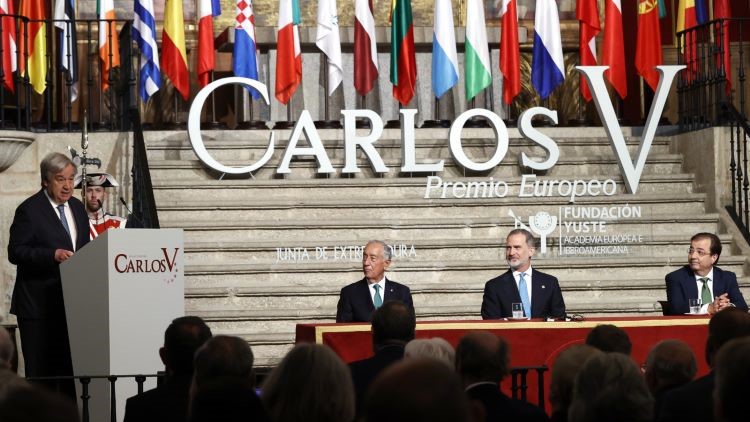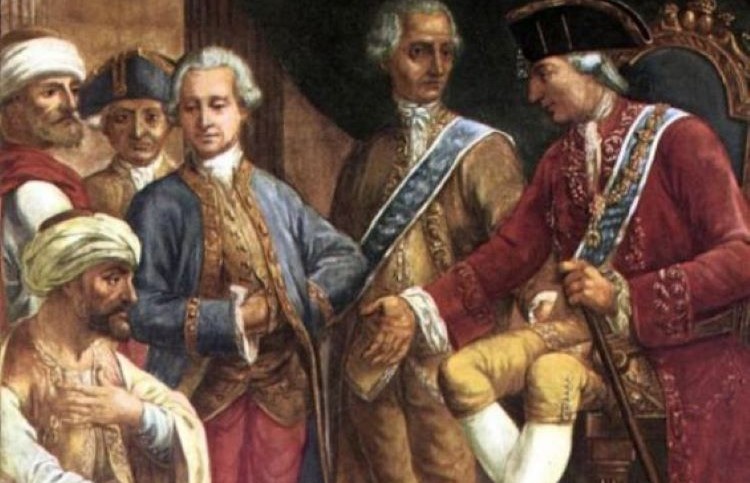Eduardo González
The Secretary General of the United Nations, Antonio Guterres, warned yesterday, after receiving the Charles V European Award at the Monastery of San Jerónimo de Yuste (Cáceres), that “the UN and the European Union were created in the name of peace, after the horror of two world wars”, and, therefore, it is necessary to “try everything to peacefully resolve our disagreements” and to remember that, “instead of bullets, we need diplomatic arsenals”.
Guterres received yesterday the 16th edition of the Charles V European Award at the Monastery of San Jerónimo de Yuste (Cáceres), on the occasion of Europe Day and under the presidency of King Felipe VI, honorary president of the European and Ibero-American Academy of Yuste Foundation. This is the third time that the Carlos V European Award has gone to a Portuguese politician. On the two previous occasions, the winners were José Manuel Durão Barroso (2014) and Jorge Fernando Branco de Sampaio (2004). Guterres, UN secretary-general since 2017, was prime minister of Portugal between 1995 and 2002.
The ceremony was attended by the President of Portugal, Marcelo Rebelo de Sousa; the Portuguese Prime Minister, António Costa; the High Representative of the European Union for Foreign Affairs and Security Policy, Josep Borrell; the Minister of Defense, Margarita Robles; the President of the General Council of the Judiciary, Rafael Mozo; the Ibero-American Secretary General, Andrés Allamand, and the President of the Regional Government of Extremadura, Guillermo Fernández Vara.
After receiving the award, Guterres delivered a speech in which he warned that “never since the creation of the UN and the EU” had the universal values of human dignity, freedom and equality “that unite us as a human family” been “so threatened”. “War is not a thing of the past, divisions persist, and are even growing” and “families are being forced to flee war or extreme weather events on a scale not seen in decades,” he added.
“The United Nations, like the European Union, was created in the name of peace, after the horror of two world wars,” and so “peace remains our North Star and our most cherished goal,” the UN Secretary-General continued. “Today we live in a world where peace is elusive and weakened and violence is rampant in too many corners of the globe,” he lamented.
“Russia’s invasion of Ukraine, in violation of the UN Charter and international law, is causing massive suffering and devastation to the country and its people, and adds to the global economic dislocation triggered by the COVID-19 pandemic,” he added. Apart from that, “entire regions such as the Middle East and the Sahel are ravaged by protracted conflicts that seem to have no end in sight” and “often, the situation deteriorates drastically overnight, the situation in Sudan being the saddest recent example,” he continued.
“Peace must never be underestimated or taken for granted, we must work for and for it, every day, relentlessly,” Guterres warned. “In a world that is tearing itself apart, we must heal divisions, prevent escalations, listen to grievances” and, therefore, “instead of bullets, we need diplomatic arsenals. This is what the Charter of the United Nations states. Negotiation, mediation, conciliation, arbitration…, we must try everything to resolve our disagreements peacefully,” he said.
Guterres also warned against “climate chaos”, which “triggers fires, floods, droughts, as here in Spain, and other extreme weather phenomena that affect all continents” and which “every year” forces “millions of people” to “seek refuge in equally vulnerable countries and communities”.
António Guterres also warned that, “as we celebrate this year the 75th anniversary of the Universal Declaration of Human Rights, rights and freedoms – civil and political, cultural, economic and social – are also being eroded and democratic principles and the rule of law are too often attacked and undermined.” “In the face of rising xenophobia, racism and extremism, we must defend our common humanity, we must reject hate speech that exploits differences and undermines social cohesion, and we must protect and promote the Universal Declaration, stand united and move forward into a new era of respect for the human rights of all people,” he said.
“That is why I am pleased to award, as part of the Prize presented to me today, a scholarship to students who are being trained in migration, refugee and human rights issues,” because “we need more experts in all these areas,” he announced. “I am also pleased to donate the remaining portion to Spain with UNHCR, an organization that has been working tirelessly for refugees for thirty years,” which “demonstrates the solidarity of the Spanish people” and is “an example for all of us,” he added.
Apart from that, Guterres warned that “the world needs a strong Europe, which looks outwards; not a Europe closed in on itself”, because “we will not have a multipolar world, we will not have a multilateralism that works, without a strong and united Europe”. “We need a Europe that relentlessly defends universal values and fundamental rights for all, that contributes fully to a multipolar world, with international relations based on justice, and helps the most vulnerable” and, therefore, “on this Europe Day, let us reaffirm the ideals of peace, justice and international cooperation.”
Felipe VI
For his part, King Felipe VI closed the event with a speech in which he praised the “tireless efforts” of António Guterres “to achieve more consensus, to bring together more understanding and more wills to face the enormous global challenges without surrendering the high ethical and moral principles that are both in the origin and design of that organization, common home of all Nations, and in the personal trajectory of service and dedication, to his country, to Europe and now to multilateralism that also represents the UN”.
“We live in the EU, a project and a way of life based on values that have built the best place for democracy, rights, freedom, equality and solidarity. We must all work together to make that its banner in this world,” the King continued. “Europe must assert its voice in this new context of transformation of the International Order on the basis of the values and principles that are its hallmark,” he warned.
“The degree of complexity and difficulty of the current situation requires making decisions that will condition our future” and, in the case of the EU, “we are talking about the transition to renewable energies and the humanitarian challenge of refugees and migrants”, issues “that must motivate a collective response, because the EU cannot be understood without the solidarity of all its Member States and all European citizens”. For all these reasons, he continued, “among the most recent challenges that Europe has had to face – of course, including the war in Ukraine, provoked by the unacceptable Russian invasion – is that of reaffirming and cohesion with even greater strength and determination”.
“Next July, Spain will assume the presidency of the Council of the EU and it is a great opportunity for our country to boost the relationship between the EU and Ibero-America,” the Monarch recalled. “The Union as a whole must understand that, in order to be a major geopolitical player in the current world situation, the connection with Ibero-America is a matter that affects all European countries equally, that it is strategic. Spain and Portugal know this well and it leads us to insist tirelessly on this message,” he added.
The award
The jury of the XVI edition of the Charles V European Award has highlighted Guterres’ work at the head of the international organization in promoting “actions to respond to the COVID-19 pandemic, to the war in Ukraine, to address the climate emergency and to achieve ambitious reforms to face the challenges of the 21st century”. He also emphasized the determination shown by the UN Secretary General to fight climate change by promoting “sustainable development and placing the 2030 Agenda as the global roadmap focused on people and the planet”.
Since 1995, the European and Ibero-American Academy of Yuste Foundation has been presenting the Charles V European Award to those people, organizations, projects or initiatives that, through their efforts and dedication, have contributed to the general knowledge and enhancement of the cultural, social, scientific and historical values of Europe, as well as to the process of European construction and integration.
The people awarded so far have been Jacques Delors (1995), Wilfried Martens (1998), Felipe González (2000), Mikhail Gorbachev (2002), Jorge Sampaio (2004), Helmut Kohl (2006), Simone Veil (2008), Javier Solana (2011), José Manuel Durão Barroso (2014), Sofia Corradi (2016), Marcelino Oreja Aguirre (2017), Antonio Tajani (2018), the Council of Europe’s Cultural Itineraries project (2019), Angela Merkel (2021), the European Disability Forum (2022) and António Guterres (2023).






